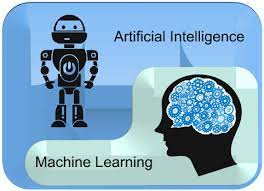Artificial Intelligence and Machine Learning: Transforming the Future
Artificial Intelligence (AI) and Machine Learning (ML) have become integral parts of the modern technological landscape, influencing various sectors from healthcare to finance. These technologies are not only reshaping industries but also redefining how businesses operate and make decisions.
Understanding Artificial Intelligence
AI refers to the simulation of human intelligence processes by machines, especially computer systems. It encompasses a range of capabilities, including learning, reasoning, problem-solving, perception, and language understanding. AI aims to create systems that can perform tasks that would typically require human intelligence.
The Role of Machine Learning
Machine Learning is a subset of AI that focuses on the development of algorithms that enable computers to learn from and make predictions or decisions based on data. ML algorithms improve their performance over time as they are exposed to more data. This ability to learn autonomously makes ML a powerful tool for handling complex tasks.
Applications Across Industries
- Healthcare: AI and ML are used for predictive analytics, personalised medicine, and improving diagnostic accuracy. They assist in analysing medical images and predicting patient outcomes.
- Finance: In the financial sector, these technologies help in fraud detection, risk management, algorithmic trading, and personalised banking services.
- Retail: Retailers leverage AI for inventory management, customer service chatbots, personalised marketing strategies, and enhancing customer experiences.
- Automotive: Autonomous vehicles rely heavily on AI and ML for navigation, object detection, and decision-making processes on the road.
The Challenges Ahead
Despite their potential benefits, AI and ML present several challenges. Ethical considerations such as data privacy, bias in algorithms, and job displacement need careful attention. Ensuring transparency in AI decision-making processes is also crucial for building trust among users.
The Future of AI and ML
The future holds immense possibilities as these technologies continue to evolve. Advances in deep learning and neural networks promise even greater capabilities in processing complex datasets. As research progresses, AI is expected to become more integrated into everyday life while addressing current limitations through innovative solutions.
The journey of artificial intelligence and machine learning is just beginning. Their transformative power will undoubtedly continue to shape industries worldwide while offering new opportunities for innovation and growth.
Exploring the Benefits of Artificial Intelligence and Machine Learning: Efficiency, Decision-Making, Personalisation, Prediction, Cost Savings, and Innovation
- Enhanced Efficiency
- Improved Decision-Making
- Personalisation
- Predictive Capabilities
- Cost Savings
- Innovation Driver
Exploring the Challenges of Artificial Intelligence: Addressing Bias, Job Displacement, and Ethical Concerns
- 1. Bias in Algorithms
- 2. Job Displacement
- 3. Data Privacy Concerns
- 4. Lack of Transparency
- 5. Security Risks
- 6. Overreliance on Technology
- 7. Ethical Dilemmas
Enhanced Efficiency
Artificial intelligence and machine learning significantly enhance efficiency by automating a wide range of tasks, which in turn leads to increased productivity and streamlined processes. By taking over repetitive and time-consuming activities, AI and ML allow human workers to focus on more strategic and creative aspects of their roles. This automation not only reduces the likelihood of human error but also accelerates operations, enabling businesses to meet demands more swiftly and effectively. As a result, organisations can optimise resource allocation, reduce operational costs, and ultimately improve overall performance. The adoption of AI and ML technologies thus represents a powerful means for companies to remain competitive in an increasingly fast-paced world.
Improved Decision-Making
Artificial intelligence and machine learning significantly enhance decision-making processes by efficiently analysing vast amounts of data to uncover patterns and insights that might be missed by human analysis alone. By processing large datasets at remarkable speeds, these technologies can identify trends, predict outcomes, and offer data-driven recommendations that enable businesses and organisations to make more informed decisions. This capability is particularly valuable in sectors such as finance, healthcare, and logistics, where timely and accurate decisions are crucial. As a result, AI and ML not only improve operational efficiency but also provide a competitive edge by facilitating strategic planning and innovation based on comprehensive data insights.
Personalisation
One of the significant advantages of artificial intelligence and machine learning is their ability to deliver personalised experiences to users. By analysing vast amounts of data, AI and ML can identify patterns and preferences, allowing businesses to offer tailored recommendations that enhance customer satisfaction. In e-commerce, for instance, these technologies can suggest products based on a user’s browsing history and previous purchases, creating a more engaging shopping experience. Similarly, in content delivery platforms, AI-driven algorithms curate personalised content feeds that align with individual interests and viewing habits. This level of personalisation not only improves user engagement but also fosters loyalty by making interactions more relevant and meaningful.
Predictive Capabilities
Machine learning algorithms offer valuable predictive capabilities by analysing historical data to forecast outcomes, enabling businesses to proactively anticipate trends and risks. By leveraging these predictive insights, organisations can make informed decisions, develop effective strategies, and mitigate potential challenges before they arise. This proactive approach empowered by machine learning not only enhances operational efficiency but also enables businesses to stay ahead of the curve in a rapidly evolving market landscape.
Cost Savings
Artificial Intelligence and Machine Learning offer significant cost-saving benefits for businesses by automating repetitive tasks and optimising operations. By streamlining processes that traditionally required substantial human effort, AI and ML reduce the need for extensive manual labour, thereby cutting down on associated costs. These technologies enable businesses to operate more efficiently by minimising errors and improving accuracy in data processing. Additionally, AI-driven analytics provide insights that help companies make informed decisions, further enhancing operational efficiency. As a result, businesses across various sectors can allocate resources more effectively, ultimately leading to increased profitability and competitive advantage.
Innovation Driver
Artificial intelligence serves as a powerful innovation driver by enabling the creation of products, services, and solutions that were once beyond the realm of possibility. By harnessing the capabilities of AI and machine learning, businesses can explore new frontiers in various fields, leading to breakthroughs that redefine industry standards. These technologies facilitate rapid prototyping and testing, allowing for the swift development of innovative solutions tailored to meet evolving consumer needs. As a result, AI not only accelerates the pace of innovation but also expands its scope, opening up opportunities for advancements that transform everyday life and drive economic growth.
1. Bias in Algorithms
Bias in algorithms is a significant concern in the realm of artificial intelligence and machine learning, as these systems can inadvertently inherit and perpetuate biases present in their training data. When AI models are trained on datasets that reflect historical prejudices or societal inequalities, they may produce outcomes that unfairly disadvantage certain groups. This issue is particularly troubling in areas such as recruitment, law enforcement, and lending, where biased decisions can have profound impacts on individuals’ lives. The challenge lies in ensuring that AI systems are trained on diverse and representative data while incorporating fairness checks to mitigate any unintended bias. Addressing this con is crucial for fostering trust and ensuring that AI technologies are used ethically and equitably across all sectors.
2. Job Displacement
The rise of automation driven by artificial intelligence and machine learning technologies poses significant concerns regarding job displacement across various industries. As machines become increasingly capable of performing tasks that once required human intervention, there is a growing risk that many traditional roles may become obsolete. This shift could particularly affect sectors such as manufacturing, retail, and transportation, where routine and repetitive tasks are prevalent. While AI and ML can lead to increased efficiency and productivity, they also necessitate a re-evaluation of the workforce landscape. It becomes imperative for businesses and policymakers to address these challenges by investing in reskilling programmes and creating new opportunities that leverage human creativity and problem-solving abilities alongside technological advancements.
3. Data Privacy Concerns
The extensive collection and analysis of personal data by artificial intelligence and machine learning systems raise significant privacy concerns. As these technologies rely heavily on vast amounts of data to function effectively, there is an inherent risk of misuse or unauthorised access to sensitive information. This can lead to breaches of privacy, where individuals’ personal details are exposed or exploited without their consent. The potential for such misuse is heightened by the increasing sophistication of AI and ML algorithms, which can infer detailed insights about individuals from seemingly innocuous data points. Ensuring robust data protection measures and transparent practices is crucial to mitigate these risks and maintain public trust in AI-driven solutions.
4. Lack of Transparency
A significant concern with artificial intelligence and machine learning is the lack of transparency inherent in complex algorithms. These sophisticated systems often operate as “black boxes,” making it challenging to discern how they arrive at specific decisions or predictions. This opacity can lead to difficulties in troubleshooting errors, ensuring accountability, and building trust among users. In sectors like healthcare and finance, where decision-making processes have critical consequences, the inability to fully understand AI-driven outcomes poses ethical and practical challenges. As AI continues to integrate into various aspects of life, addressing this lack of transparency becomes imperative to ensure that these technologies are used responsibly and effectively.
5. Security Risks
One significant concern regarding artificial intelligence and machine learning is the potential for security risks. AI systems, like any other technology, are susceptible to vulnerabilities that can be exploited by malicious actors. These vulnerabilities may lead to cyberattacks or manipulation of outcomes, posing serious threats to organisations and individuals alike. For instance, adversaries could manipulate data inputs to deceive AI algorithms, resulting in incorrect decisions or predictions. This risk is particularly concerning in critical sectors such as finance, healthcare, and national security, where the integrity of AI systems is paramount. As AI becomes more integrated into these areas, ensuring robust security measures and developing resilient systems will be crucial to safeguarding against potential exploitation.
6. Overreliance on Technology
Overreliance on artificial intelligence and machine learning solutions poses the risk of diminishing critical thinking skills and human decision-making abilities. As organisations increasingly depend on these technologies to streamline processes and make data-driven decisions, there is a concern that individuals may become less adept at analysing situations independently. This dependency could lead to a decline in problem-solving capabilities, as people might defer to automated systems without questioning their outcomes or considering alternative solutions. Furthermore, excessive reliance on AI could undermine the development of intuitive judgement skills that are crucial in scenarios where nuanced human understanding is required. Balancing technological advancement with the cultivation of human intellect is essential to ensure that AI serves as an aid rather than a replacement for human reasoning.
7. Ethical Dilemmas
The ethical dilemmas posed by artificial intelligence and machine learning are significant, particularly when these technologies are applied in sensitive areas such as autonomous weapons, surveillance, or social manipulation. The use of AI in autonomous weapons raises moral concerns about the delegation of life-and-death decisions to machines, potentially leading to unintended casualties and escalating conflicts. Surveillance powered by AI can infringe on privacy rights, enabling unprecedented levels of monitoring that could be misused by authoritarian regimes. Additionally, the capacity for AI to manipulate social behaviour through targeted misinformation or biased algorithms poses a threat to democratic processes and societal cohesion. These moral implications necessitate rigorous ethical guidelines and oversight to ensure that AI technologies are developed and deployed responsibly.




